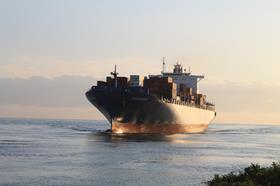
APL yesterday (10 May) announced a 50.7 per cent reduction in its carbon dioxide emissions per transported container per kilometre in 2017, compared to its base level in 2009.
This achievement marks APL’s eighth consecutive year of improved environmental performance, as reported in the Business for Social Responsibility’s Clean Cargo Working Group (CCWG) Environmental Performance Assessment (EPA) of APL’s 2017 carbon dioxide emission data, the firm said.
The CCWG EPA data was verified by Lloyd’s Register Group according to the CCWG verification protocol and principles of ISO14064-3:2006 standard.
Commenting on the results, APL global head for safety security and environment Dennis Yee said: “We are proud to raise the bar in reducing the carbon footprint of our fleet operations once again. APL’s concerted efforts to improve our environmental efficiency year after year underscore our commitment to a greener and more sustainable maritime industry. Responsible environmental management is a cornerstone of APL’s operations and we will persevere in our pursuit for excellence in sustainable shipping.”
While APL saw almost a 3 per cent improvement from the 48 per cent reduction in carbon dioxide emissions per transported container per kilometre in 2016, APL-operated vessels also recorded fuel savings of almost 5 per cent in 2017, compared to a year ago.
APL said these achievements are attributable to its holistic approach in driving operational efficiencies, fleet and voyage optimisation, as well as the deployment of a fuel-efficient fleet of vessels.
Meanwhile, gearing up for the global sulphur cap that comes into effect from 1 January 2020, APL will be using low-sulphur compliant fuel oil across its vessel fleet, employing exhaust gas cleaning systems or “scrubbers” on some vessels that clean emissions before they are released into the atmosphere, and deploying LNG-fuelled vessels, it said.
As part of the CMA CGM Group, APL will also make further inroads in environmental protection and ocean conservation as the group takes delivery of nine new 22,000 TEU liquefied natural gas (LNG)-powered ships from 2020 onwards.
APL’s green shipping efforts also encompass ocean biodiversity protection, the firm said. In 2017, 32 APL-owned vessels were fitted with IMO-compliant ballast water treatment systems. The remaining fleet continued to deploy the intermediate solution of mid-ocean ballast water exchange to remove, render harmless, or avoid the uptake or discharge of aquatic organisms and pathogens within ballast water and sediments. APL also remains steadfast in protecting endangered species by prohibiting shipments such as shark fin, it said.



